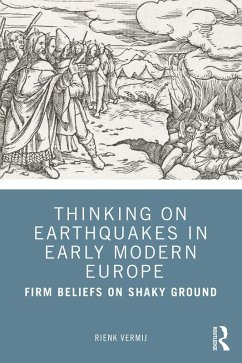This book is the first extensive study of ideas on earthquakes before the Lisbon earthquake in 1755. Earthquakes had a deep impact on pre-modern European culture and reactions to them stood in a long tradition that, before this study, had yet to be explored in detail.
Dieser Download kann aus rechtlichen Gründen nur mit Rechnungsadresse in A, B, BG, CY, CZ, D, DK, EW, E, FIN, F, GR, HR, H, IRL, I, LT, L, LR, M, NL, PL, P, R, S, SLO, SK ausgeliefert werden.
'Following a chronological development, this volume represents an important synthesis of the scientific opinions and theories that have matured over the centuries in the European cultural sphere, showing how the ancient and medieval philosophers, who provided rational hypotheses for the origin of earthquakes, both switched to supernatural and sectarian explanations, diverting science towards social, political and religious needs.The analysis carried out by Rienk Vermij testifies to the cultural and knowledge development in modern Europe and represents a fundamental source for scholars of the history of geology and science.'
Marco Pantaloni, Geological Society of Italy, 2020 (https://www.socgeol.it/N2838/thinking-on-earthquakes-in-early-modern-europe.html)
'In short, Vermij offers a fascinating study on confessionalized science and the study of earthquakes. His sensitivity to the political and social use of earthquake explanations is commendable and a welcome addition to disaster studies. [...] His intention to also look at explanations among the wider populace and his inclusion of different media are innovative for a history of science.'
Marieke van Egeraat, Early Modern Low Countries, 2021
'Thinking on Earthquakes is a solid piece of historical research [...] this book fills a long-standing gap in the literature on the early modern understanding of earthquakes, and it will prove a valuable reference work for historians and philosophers of science as well as for geologists, teachers, and science communicators.'
Francesco Luzzini, Early Science and Medicine, 2021
'[...] As the book demonstrates, the subject of earthquakes can certainly serve as an excellent point of entry for inquiring into the shifting configurations of science and religion in early modern Europe. [...] Thinking on Earthquakes fills a gap in scholarship. It makes a valuable contribution to the history of geology, the history of science and religion, and disaster studies.'
Fa-ti Fan, Isis, The Journal of the History of Science Society, vol. 113, no.1, 2022
'By providing a chronicle of the events, the volume is a worthy contribution to the history of those seismic beliefs and ideas that had developed in the European milieu over the centuries. The author points out how ancient and medieval philosophers, after suggesting rational hypotheses about the origin of earthquakes, moved on to supernatural and confessional explanations, turning science to social, political and religious needs. Rienk Vermij's work not only bears witness to the cultural history of modern European society, but also is a fundamental source for historians of geology and science.'
Marco Pantaloni, Italian Institute for Environmental Protection and Research (ISPRA), Physis International Journal for the History of Science Vol. LVII (2022)
Marco Pantaloni, Geological Society of Italy, 2020 (https://www.socgeol.it/N2838/thinking-on-earthquakes-in-early-modern-europe.html)
'In short, Vermij offers a fascinating study on confessionalized science and the study of earthquakes. His sensitivity to the political and social use of earthquake explanations is commendable and a welcome addition to disaster studies. [...] His intention to also look at explanations among the wider populace and his inclusion of different media are innovative for a history of science.'
Marieke van Egeraat, Early Modern Low Countries, 2021
'Thinking on Earthquakes is a solid piece of historical research [...] this book fills a long-standing gap in the literature on the early modern understanding of earthquakes, and it will prove a valuable reference work for historians and philosophers of science as well as for geologists, teachers, and science communicators.'
Francesco Luzzini, Early Science and Medicine, 2021
'[...] As the book demonstrates, the subject of earthquakes can certainly serve as an excellent point of entry for inquiring into the shifting configurations of science and religion in early modern Europe. [...] Thinking on Earthquakes fills a gap in scholarship. It makes a valuable contribution to the history of geology, the history of science and religion, and disaster studies.'
Fa-ti Fan, Isis, The Journal of the History of Science Society, vol. 113, no.1, 2022
'By providing a chronicle of the events, the volume is a worthy contribution to the history of those seismic beliefs and ideas that had developed in the European milieu over the centuries. The author points out how ancient and medieval philosophers, after suggesting rational hypotheses about the origin of earthquakes, moved on to supernatural and confessional explanations, turning science to social, political and religious needs. Rienk Vermij's work not only bears witness to the cultural history of modern European society, but also is a fundamental source for historians of geology and science.'
Marco Pantaloni, Italian Institute for Environmental Protection and Research (ISPRA), Physis International Journal for the History of Science Vol. LVII (2022)

